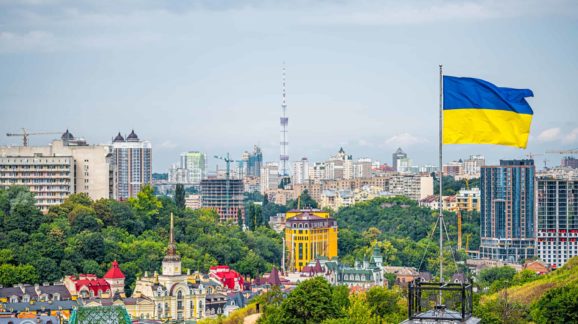Stablecoins Come of Age in Ukraine-Russia Conflict

Photo Credit: Getty
Across the globe, people living under oppressive regimes are already familiar with stablecoins—digital assets pegged to a stable monetary value, usually the U.S. dollar. Now, with the Ukraine-Russia conflict, the rest of the world can see their benefits
Stablecoins originated as way for cryptocurrency traders to avoid constant fiat money conversions. As their usefulness became apparent, their applications grew. Today, they are indispensable for crypto trading, used for cross border payments, and are being integrated into Web3 applications and incorporated into traditional payment systems.
Importantly, they also allow people in dire financial straits to maintain purchasing power amidst runaway inflation, profligate central banks, and war. Crypto commentator Nic Carter has discussed how desperate Venezuelans use applications like LocalBitcoins as a backdoor way to acquire dollar-pegged stablecoins.
Crypto intelligence firm Chainalysis described in August 2020 how stablecoin Tether had become more popular in East Asia, including in China, than Bitcoin. According to the report, “Tether has become the de facto fiat stand-in for Chinese cryptocurrency users and primary means of on-ramping to Bitcoin and other standard cryptocurrencies.” (It is unclear if this remains the case after the latest Chinese crackdown). The story is the same in Turkey and Nigeria, where people are fleeing mismanaged fiat currencies for stablecoins.
In Ukraine, stablecoin Tether has become so valuable it trades for a premium of as much as $1.10 for an asset designed to always peg at $1. In an interview with CoinDesk TV, exchange founder Michael Chobanian stated:
The majority of people have nothing else to choose apart from crypto. We’re talking about millions of dollars of cash that wants to go into crypto … but we can’t find people who are willing to do the opposite, sell it.
Russians are also flocking to stablecoins. As the U.S. and its allies unite against Putin’s aggression with sanctions and other measures, ordinary Russians are ditching the ruble for stablecoins. This is tantamount to a vote of no confidence by the Russian people in the regime’s actions, and may even hasten its demise if citizens become averse to transacting in rubles.
As dollar-pegged stablecoins provide a store for value everywhere, the Biden administration and its allies are seemingly the only ones not celebrating. Last November, the President’s Working Group and other financial regulators released a scathing report on stablecoins that suggested that they be fully integrated into the financial system through bank charters or banned. The report warned of myriad risks and called on financial regulators to use powers granted to them by the Dodd-Frank financial overhaul law to declare them “systemically important,” and therefore subject to unilateral regulation if Congress did not act. An executive order declaring crypto a “national security” matter is also reportedly forthcoming.
Meanwhile, central banks around the world, including the Federal Reserve, are either implementing or considering their own digital money, known as central bank digital currencies. But government versions of crypto would not bring stablecoins’ benefits, and come with many risks, from enabling intrusive systems of government control, such as via a social credit score, as in China, to loss of financial privacy—which is a threat everywhere. As Nic Carter notes:
It’s important to understand that the popularity of stablecoins or “crypto-dollars” is not solely due to their digital nature but because of the transactional freedom that they offer to users.
None of these proposals are necessary. Events have shown that stablecoins work without being subject to the flawed U.S. financial regulatory apparatus, and are the currency of choice when circumstances force people into the most desperate situations.
The Ukraine-Russia conflict should settle this question. The world can see in real time how stablecoins help people and how government alternatives would only entrench monetary power with those that cause or at least contribute to these conflicts and other dire situations in the first place.